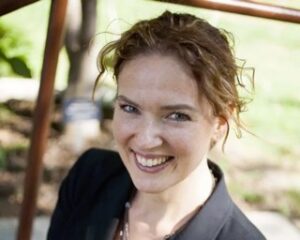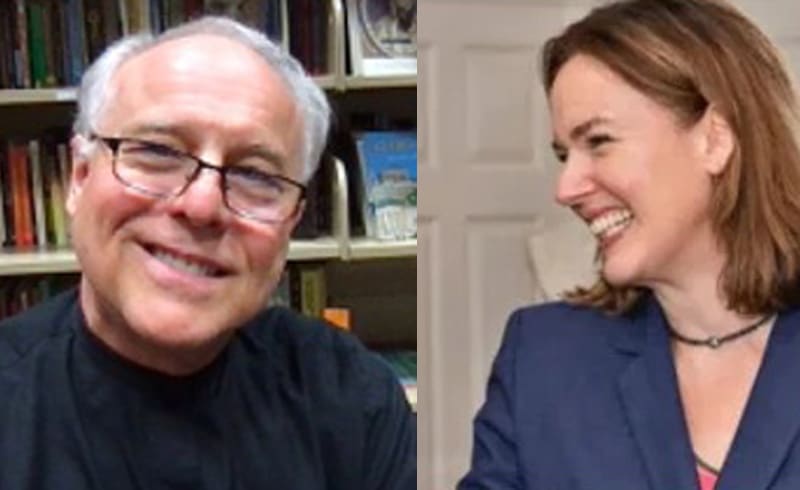July 17, 2022

Fr. James DiLuzio: In what religious tradition were you raised?
Dr. Vanessa Avery: I was raised conservative Jewish, which is the middle way, if you will. Conservative Judaism is the path that chooses to preserve tradition but remains open to change and to the needs of the community.
What were the most positive impressions your faith upbringing had upon you?
I’ll begin by saying I grew up in Queens, NY, in a house with my extended family— there were 8 of us. There were my mother’s grandparents, all their kids, one of whom was my mom, and my great-grandfather lived with us, too. There was always a lot of activity going on. Religion was the foundation of the household but in an understated way. My grandparents were observant — we kept kosher, we kept shabbat, we observed the high holidays when I would either go to shul with my grandfather or stay at home to help my grandmother, my grandparents were also very generous and charitable. Shabbat dinners and Passover celebrations — when the family was all together and when we had guests— were some of my favorite times. This was the way we lived. It was traditional and it was fun. I think the positive impression I have of my faith upbringing was simply due to the fact that this was the way we lived. There was not much talk about it. For a long time, I felt like there should have been more talk about it. Should we have been having deep discussions around the dinner table? Should we have been reading the Torah? I didn’t go to Hebrew School, so I wasn’t doing this on my own. (I wound up compensating later through my four university degrees!) But I’ve come to realize that just living observantly — honoring the traditions, being charitable and open— and never being forced to think a certain way or do anything a certain way. My grandparents never had to persuade me to say prayers or perform a ritual, they just modeled it for me in a positive way. This is what left the most positive impression on me.
Any troubling impressions from childhood? How did you / do you wrestle with them? Are they still with you? Have you resolved them?
My childhood was very happy. I had a stable family, a lot of socialization, a lot of friends. The only troubling aspect I would say was that I didn’t know my father. He got very ill shortly after I was born and needed to go back his native Germany. He and my mother kept in some contact, but I think emotionally it was hard for her, so our families distanced from each other.
I never knew my father or his family. This wasn’t troubling for me mainly because I had a good family around me, but I did have questions about what my father was like. I dreamed about him a lot. He was an intelligent and gentle man from what I have heard and from my impressions. He was absent but I knew he loved me, and I always felt like we were connected somehow. I did look for him from time to time, but it was hard to locate someone overseas— especially in “those days” before the explosion of the internet.
In the year 2000, though, I was doing another search for him and did find something. I found out my father had died the year before. It was very sad, especially as I had to relay the news to my mother. They hadn’t been in touch for decades, but I know it still affected her deeply. It wasn’t until very recently, after my mom, too, passed away, that I started searching again — this time for my father’s family — his mother and his sister. This time I had ancestry.com to help me. There was nothing under his name or his family members’ names for a long time. Then one evening out of the blue I received a notification. A link to my father’s sister who I never would have found otherwise due to her married name.
I immediately wrote the man who posted it, we talked the next day, and I asked him if he would please let my father’s sister know I’d like to meet her. And I gave him my phone number to pass on. The very next night we were on the phone with each other well into the night. We talked until about 2am.
She lives in Queens and has two children of her own. She told me stories about when she held me as a baby. She told me about how my father loved me and my mother, and what his life was like after he went back to Germany. She told me about the books he published on poetry and philosophy. She told me about my grandmother. And she told me about how they died. Something was completed within me, meeting her. Yes.
What are your most cherished religious practices at this stage of your life?
Traditionally speaking, Passover has always held a special place in my heart as a time to gather, to thank God for our freedom, and to explore new ways to be in our freedom— not just physical or historical freedom, but spiritual, mental, emotional freedom, too. And it’s important to me that we do this ourselves but also in community. My husband and I are lucky that we have been able to put some roots down in CT now and have a community to celebrate with. Yom Kippur— the day of atonement— and the days leading up to it— which are days of reflection, contrition, and forgiveness —this is the most spiritually resonant time of the year for me.
On a more daily basis, my spiritual practice takes place in nature. Nature in all its grandeur and its fragility helps me feel at peace — being by the ocean or hiking one of the amazing trails near my home. Nature is a way to take a break from the structures of daily life, and hiking is a mindful practice— you cannot daydream as you must find your footing each step of the way. It brings presence and calm.
What are your favorite hobbies, leisure activities?
It’s hard to find a time for hobbies these days, but I do make it a point to exercise every day. I often for time wind up going to the gym, but I prefer exercising in nature— hiking, skiing, walking on the beach. Even a walk around my neighborhood can serve me well.
My other joys are playing music — which I’m getting back to. I grew up playing several instruments, giving concerts, I played in bands, tried my hand at songwriting. Like my nature activities, music for me is powerful— it cuts through the mind right to the soul— to the depth of emotion. Playing and writing music is a form of self-expression— sometimes I can express myself better through music than through words. Music is also, for me, a timeless activity. I could play through the night and not even realize the time that had gone by. It is somewhat mystical in this sense for me. Timeless, all absorbing, pure self-expression.
In your view, how conscious must we be of God, Divine Power, or Spirit to see our activities as religious or faith-filled experiences? Do we mostly claim these experiences through hindsight?
I think spiritual experiences are possible without the language of God. The way you phrased it, though… how conscious must we be of God or a Divine Power… is interesting. In my exchanges with people and in my own research I find that spiritual experiences will be explained through the natural world if one does not bring a consciousness of the divine to them. I’ve had a few experiences that I consider to be spiritual ones. Where my sight changed. Independently, I have also witnessed a miracle. I find that if I share these experiences with people without a consciousness of the Divine, they seek natural explanations for them.
What inspired you to become involved in multi-faith endeavors? What were your first forays into comparative religions and multi-faith dialogue?
I thank my mother for leading me to this work. Though Jewish, my mother enjoyed exploring the religions of the world. She brought me to mass on Christmas Eve, to a Zen Center to meditate, to Sri Chinmoy’s ashram in Queens. I guess these were my first forays into comparative religions and multi-faith experiences. In terms of dialogue across faiths, this began at university. As a comparative religion major at McGill, I began my intellectual study of the world’s religions. But when I entered my master’s degrees, I found I was either the only Jewish student or one of two in my program. (I went to Christian divinity schools, so this was expected.). But as a Jewish person in a Christian-based context, I found myself needing to be able to articulate my perspectives on scripture, ritual, and beliefs better. And this was formative for me.
How did you come to engage in SHARING SACRED SPACES?
I was actually hired to design a Sharing Sacred Spaces project in Ohio on a grant— not by Sharing Sacred Spaces directly— but this is how I was introduced to Suzanne Morgan — the founder’s work.
When I met Suzanne Morgan and learned more about the program she had designed, my heart leaped. Her interreligious program involved raising awareness of religious differences, finding commonalities, the humanization of those involved. But most uniquely, she designed a program that does this through a process focused on SACRED ARCHITECTURE AND SPACE.
The program was a proven success from its pilot run in Chicago, and a still fresh and new idea for the world, but the program was a standalone and existed without a business plan for development and growth.
I dropped everything and went to work with Suzanne on building up the organization. We ran two more interreligious processes and then applied for 501c3 status, which we received in 2019. Now we are launching our 5th process in Northern Virginia with generous support from both individual donors and foundations.
What do you consider to be among your best accomplishments?
Marrying my incredible husband and our children.
How might others participate in your work or similar interreligious programs?
We are committed to running our process in 80 cities around the world. We also always have projects for volunteers. I welcome people to contact me at 203-609-3914 or write to me at [email protected].
